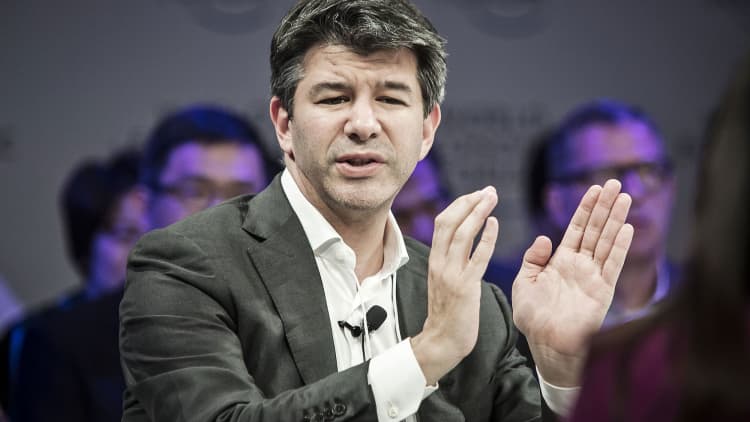Blake Irving knows how hard it is to change first impressions.
More than four years into his tenure as the CEO of web domain registrar and cloud platform GoDaddy, Irving still encounters men who associate the company with risqué Super Bowl ads featuring half-naked women.
"I'll be talking to folks, even in Asia, who will say 'Oh, I love your commercials' with that nudge nudge, wink wink look," Irving told CNBC. "And I'll go, which ones — the ones from 10 years ago or the ones we're doing now?"
Those decade-old ads effectively yet shamelessly exploited female sexuality to put GoDaddy on the map. While traffic to the site surged nearly 400 percent after the first controversial ad aired in 2005, the company faced backlash from women, accusing GoDaddy of a sexist corporate culture.
Yet, as the tech industry faces new pressure to change its exploitative ways amid shakeups at Uber and venture funds Binary Capital and 500 Startups, GoDaddy has emerged as the unlikely poster child of turnarounds. While women made up roughly a quarter of GoDaddy's new technical hires before Irving took over, it has doubled since.
At the recent RISE Conference in Hong Kong, the largest tech gathering in Asia, Irving was front and center at a panel to discuss diversity in the industry, arguing that men should be a driving force.
"It's not a women's problem, it's men's problem," Irving told the crowd. "This is something that we can help tremendously with, just by applying conscious thought to who we hire, how we hire and what language we use."
Irving began the turnaround by partnering with the Anita Borg Institute, releasing a diversity report that revealed pay discrepancies between male and female employees. He also hired the company's first female CTO, Elissa Murphy, and named the first woman to GoDaddy's board, former Apple executive Betsy Rafael.
[If someone is] going to get derailed because a guy acted like he was in a high school locker room for about three minutes, you're never going to get anywhere in a start-up.Melissa Guzyfounder and managing partner at Arbor Ventures
Telle Whitney, CEO at the Anita Borg Institute, said GoDaddy's transparency helped win over many female critics outraged by the company's past behavior. The non-profit group partners with roughly 70 tech companies including Alphabet, Microsoft and Facebook to increase diversity and educate employees about unconscious biases that may cause executives to overlook subtle sexism. While Whitney said she's seen huge improvements among larger firms, smaller start-ups and venture funds remain steeped in a college fraternity-like culture.
"If you think about it, start-ups are just started by a few people, let's say three young men with very little business sense," Whitney told CNBC. "Often they know directly the next 10 people, and they know directly the next 100 people. It's very easy to reach 100 and not realize that there's any bias in your hiring."
Whitney pointed to an industry-wide survey conducted in the aftermath of investor Ellen Pao's gender discrimination lawsuit against VC firm Kleiner Perkins Caufield & Byers in 2015. In the "Elephant in the Valley" report, 60 percent of women said they had been sexually harassed. Of those women, 60 percent then said they were "dissatisfied" with the course of action the company took, following their report.
"Quite often it's not malice. It's just cluelessness that makes these places very difficult to work in," Telle said.

That difficulty, however, may just be a fact of start-up life, where entrepreneurs grapple with myriad issues — from developing a sustainable business to hiring the right people for the job.
"Sexism is one of the things that you have to overcome in building a great company," according to Melissa Guzy, a Silicon Valley veteran who is founder and managing partner at Hong Kong-based Arbor Ventures. She told an audience at a RISE debate on the merits of quotas as a solution to tech's gender imbalance that if someone is "going to get derailed because a guy acted like he was in a high school locker room for about three minutes, you're never going to get anywhere in a start-up."
Guzy acknowledged that Silicon Valley's gender-related issues have been around for nearly three decades as a result of the male-dominated cultural ecosystem. To combat the sort of bad behavior highlighted in recent media reports and have a more diverse environment, the entire ecosystem needs to change, Guzy argued. That change, she said, includes more women studying science, technology, engineering and mathematics in college, becoming entrepreneurs and venture capitalists.
Silicon Valley could take a lesson or two from Asia, according to Guzy: "Asia is far better for a woman, especially as a venture capitalist and also in a technology company," she said, adding that more women held high-profile roles in the public and private sectors in the region.
For example, China's ride-hailing firm Didi Chuxing, which is valued at $50 billion, is led by Jean Liu, who serves as president. Southeast Asian rival Grab was co-founded by female entrepreneur Hooi Ling Tan. Prominent Taiwanese tech company HTC was co-founded by Cher Wang, who is chairwoman, CEO and president and Sun Yafang is the chairwoman of the board at Chinese telecommunication services provider Huawei.
To be sure, having prominent executives in big tech companies do not necessarily reflect the overall conditions for women entrepreneurs in Asia.
Earlier this year, Mastercard released its Index of Women Entrepreneurs for 2017, where it said China was in a unique position.
"Women's progress as business owners and entrepreneurs is nearly at par with leading high-income nations … despite having weaker supporting entrepreneurial conditions, knowledge assets and financial access." The report noted that statistics pointed to sluggish labor market dynamics and poor employment opportunities for both genders, but it added that female entrepreneurs faced more challenges due to the types of industries represented and cultural norms.

This week, Dell and IHS Markit released an index measuring a city's ability to attract and support high-potential women entrepreneurs. Singapore was the sole Asian representative in the top 10, ranking eighth behind New York, San Francisco, London and Boston among others. The second-highest-ranking Asian city was Hong Kong at 16.
Since the New York Times published accounts from female entrepreneurs accusing prominent tech names, including venture capitalists Chris Sacca and Dave McClure, of inappropriate behavior, the discussion on social media has in part focused on finding a solution to address this perennial problem.
Venture capitalists Theresia Gouw and Jennifer Fonstad from Aspect Ventures called on investors to pledge zero tolerance for sexual harassment or gender discrimination. News site TechCrunch penned a harassment policy template with several founders, whistleblowers, investors and activists, calling on VCs to adopt similar formal policies to protect entrepreneurs.
Meanwhile, successful women in the industry also needed to step up their game in mentoring the next generation of female entrepreneurs, engineers and venture capitalists, according to Guzy.
"I think one of the places where women have fallen down tremendously is actually being good mentors. Most women who have been successful don't actually take the time to mentor other women. I think that's something that we actually need to do a much better job of," she said.



